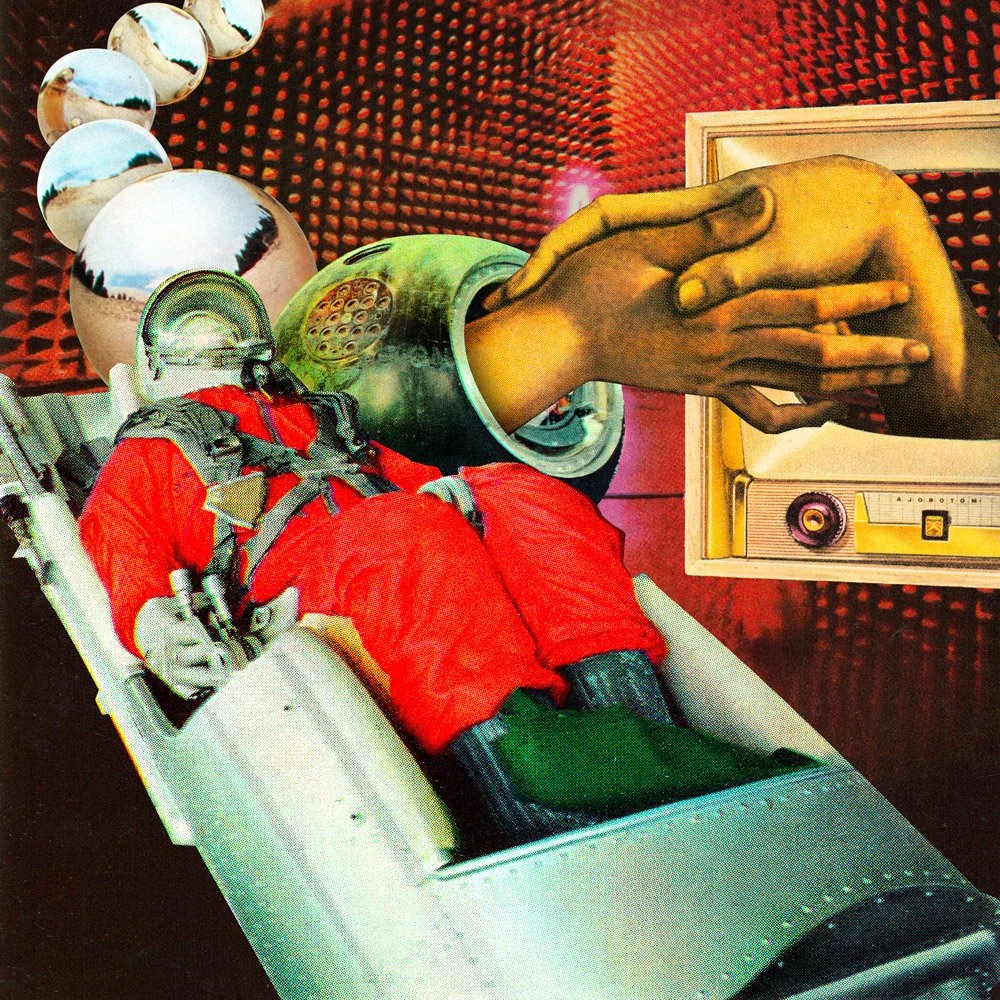Joan Seed is a Montréal-born collage artist who deftly repurposes mid‑20th‑century print ephemera to critique consumerism, gender norms, power structures, and environmental apathy. Working with printed magazine source material from roughly 1955–1970—an era of post‑WWII economic boom—she lays bare the foundations of our modern visual culture. Seed transforms advertisements once marketed as freedom and aspiration into scenes that question hypocrisy, denial, and societal veneers.
Her faceless protagonists—a woman encrusted in TV screens, a suburban family overshadowed by an enormous curios object, the Statue of Liberty drowning in idyllic waters—evoke both nostalgia and alarm. Through telling juxtapositions, she explores themes like Cluster B personality traits, the rise of surveillance and consumer manipulation, climate denial, and the invisible labor of emotional performance. Her vibrant yet unsettling compositions feel vintage and cinematic, crafted with razor-sharp wit and feminist insight.
Seed's work hovers between irony and empathy. Drawing on Pop Art influences like Warhol and Lichtenstein, she calls her style “graphic archaeology”—a reengineering of familiar visuals into socially potent, deeply layered commentary. She challenges the viewer to reconsider accepted narratives, to question the lens through which we see ourselves, and to find the stories that lie beneath glossy surfaces.
Why it matters:
- Socially conscious: Her work illuminates how culture shaped by advertising impacts gender, identity, and the planet.
- Historically informed: Seed mines her own roots and the 1955–1970 era to reveal patterns that persist today.
- Visually compelling: These large-format, museum-quality collages demand to be seen in person—for scale, texture, and full emotional range.
Featured in galleries in Chicago and Tokyo, represented by Lemonade Illustration Agency in London, Seed bridges pop-culture kitsch and postmodern critique—making her a standout in the contemporary collage scene.
————————————————————————————————————————————
Joan Seed et l’art du collage engagé
Artiste montréalaise, Joan Seed détourne avec une précision mordante l’imagerie imprimée du milieu du XXᵉ siècle pour en faire une critique cinglante du consumérisme, des normes de genre, des rapports de pouvoir et de l’apathie écologique. Elle puise dans des magazines publiés entre 1955 et 1970 – à la croisée d’un boom économique sans précédent et d’un conservatisme déstabilisé par les bouleversements sociaux – la matière première de collages qui mettent à nu l’ossature de la culture contemporaine. Les publicités, brandies comme promesses de liberté et d’élévation, se muent sous ses ciseaux en scènes qui révèlent hypocrisie, déni et faux-semblants.
Ses protagonistes – une femme encastrée dans un écran de télévision, une famille de banlieue éclipsée par un colossal objet de curiosité, la statue de la Liberté engloutie dans des eaux trop idylliques pour être innocentes – suscitent nostalgie et inquiétude. Par des juxtapositions éloquentes, Seed explore des thèmes comme les traits de personnalité de type B, la surveillance des citoyens, la manipulation consumériste, le déni climatique ou encore l’épuisant labeur émotionnel lié à l’art du paraître. Ses compositions, à la fois vibrantes, cinématographiques et dérangeantes, allient humour acéré et regard féministe incisif.
Oscillant entre ironie et empathie, nourrie par l’héritage du pop art, de Warhol à Lichtenstein, l’œuvre de Joan Seed se définit comme une forme d’« archéologie graphique » : une manière de déconstruire et de reconfigurer des images familières afin d’en révéler la portée sociale et les strates symboliques. Elle nous convie à remettre en question les récits dominants, à examiner le prisme déformant de notre regard et à dévoiler ce qui se tapit sous nos certitudes collectives.
Un regard qui dérange, un art qui éclaire – Pourquoi acquérir une œuvre de Joan Seed
Conscience sociale : son travail met en lumière l’impact de la culture façonnée par la publicité sur le genre, l’identité et la planète.
Ancrage historique : Seed s’inspire de ses propres racines et de la période 1955-1970 pour révéler des mécanismes qui opèrent encore aujourd’hui.
Force visuelle : ses collages grand format, de qualité muséale, exigent d’être vus en personne pour leur échelle, leur texture et toute la gamme d’émotions qu’ils suscitent.
Exposée dans des galeries à Chicago et à Tokyo, représentée par la Lemonade Illustration Agency de Londres, Seed tisse un lien singulier entre le kitsch de la culture pop et la critique postmoderne, ce qui fait d’elle une artiste déterminante sur la scène du collage contemporain.






